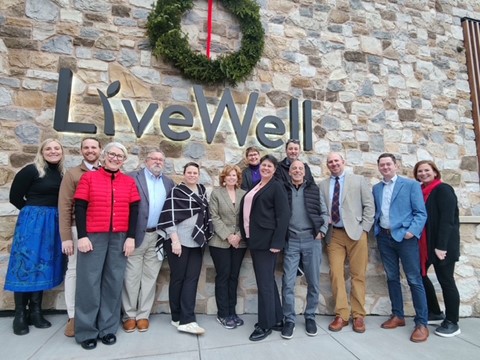
Author:
Kim Warchol, President and Founder of DCS at CPI
Let’s Work Together to Create a Dementia Capable Society - Because it Matters!
As we begin a new year, I always pause to reflect on my purpose in life and assess how well I’m fulfilling this purpose. One of the greatest gifts I’ve received in life was being called to be an occupational therapist and being led to serve those living with Alzheimer’s disease and other dementias. For the past 35 plus years I have been doing whatever I can to make the world a better place for those living with dementia, their loved ones, and caregivers. Whether it’s as a friend or a neighbor, or as the Founder and President of Dementia Care Specialists, I strive every day to help those living with dementia, their loved ones, and caregivers to thrive.
Along the journey I quickly realized there is little value in going it alone. This is not solitary work to be done by one- it is a movement. We believe it is vital to “create a Dementia Capable Society, one person, one passionate partner at a time”. A dementia capable society is an expansive chain of individuals who share this mission by compassionately embracing and ably supporting those who are living with Alzheimer’s disease and other forms of dementia. The ultimate goals are to foster inclusion (without bias), capability (in place of decline), and hope (amid despair).
Who are the essential members of a dementia capable society? Just about everybody. Society members include, but are not limited to, those who work in healthcare and senior living, anyone in the public who interacts with a person with dementia, and friends and loved ones. Each is a vital contributor and must possess compassion, understanding, and person centered, dementia capable knowledge and skill, along with a true desire to “do what’s best” for the person with dementia.
When we all lock arms with the earnest desire to achieve this shared intent and we approach this with congruent philosophy and understanding, a Dementia Capable Society is born. There are so many reasons for a Dementia Capable Society. In this blog I will describe just two of the ways this powerful force can have a profound and lasting impact.
BENEFIT #1: Improved Quality of Life:
A Dementia Capable Society prioritizes dignity and worth, always demonstrating respect for this precious soul to be able to live well. Interactions focus on helping the person with dementia to feel happy, safe, dignified, unbroken, productive, loved, and valued. Helping a person to feel this way is the priority.
Some ways members of a Dementia Capable Society accomplish this are:
- Always think of someone with dementia as a person-first, never reducing them to a disease.
- Keep the person actively engaged in meaningful activity at their best ability. This helps someone with dementia to have purpose, which is akin to ensuring there is a reason to rise each day and engage.
- Interactions are couched in patience and kindness, with the goal of being a support.
- We say please and thank you and gain permission and/or agreement instead of prioritizing our way, our will, or our control.
- We think ahead to put plans in place to prevent distress.
- We always see “behavior” as a form of communication first. When we see concerning behaviors such as agitation, resistance, anxiety, and refusal, we stop and ask ourselves, “Why”. We evaluate the potential causes of their feelings of distress, we compassionately respond to calm and address the stress trigger.
Can you think of other ways to promote quality of life for someone living with dementia?
BENEFIT #2: Optimizes abilities and reduces burden:
A Dementia Capable Society focuses on what a person with dementia CAN DO, at every stage of dementia. We see the glass as half full, understanding all the good that comes from seeing and fostering remaining abilities. We prevent excess disability (disproportionate dependence), always striving to help the person with dementia do as much for themselves as possible.
Having expertise in stages of dementia helps us enhance our communication skills to prevent confusion and misunderstandings. Understanding characteristics of each dementia stage (knowing the abilities and challenges) enables us to provide compensatory care, meaning, we do the parts of the activities someone can no longer do, and we encourage their engagement by using their abilities that remain. Therefore, the amount and type of care the “caregiver” needs to provide is lessened, reducing the burden of care.
Below are just a few of the reasons optimizing abilities & reducing burden is so beneficial:
Benefits to the person with dementia:
- Active participation in daily activities provides physical and cognitive exercise. Moving, using other motor skills, and using cognitive skills helps to prevent or slow decline.
- Helping someone to be as participatory and independent as able can have profound health benefits. For example, studies have shown that someone who feeds themselves swallows more safely and eats more.
- Emotional well-being is enhanced when feeling more capable, successful, and in control.
Benefits for care providers:
- Helping people with dementia to do more for themselves reduces the care time. Often this is related to reducing the time needed to address resistance that may bubble up when someone feels controlled, violated, or helpless.
- Helping the person do more for themselves reduces the physical burden of doing everything for someone. As an example, if we can skillfully communicate and cue someone with dementia to stand up and sit in an adjacent chair, they may be able to do this without the need for our physical assistance. This can save stress on our back that results from lifting someone who doesn’t understand what we are asking them to do.
- Setting someone up to safely engage in an activity can free up valuable time for caregivers to use on other things.
- We can reduce the burden of needing to answer the same questions repeatedly or the burden associated with supporting someone who always feels anxious.
Can you think of other benefits to optimizing abilities and independence and reducing the burden of care?
In summary, if everyone, everywhere, who interacts with those living with dementia was dementia capable, think of the profound difference it would make. By giving a sense of belonging, purpose, success, love, understanding and security to those living with dementia -it would have immense benefits for everyone. Let’s lock arms and make it happen. This is my hope for this new year.
Invest in yourself and your team!
Gain the knowledge and skills to optimize function, safety, and quality of life for those you serve and certifications to distinguish yourself or your organization as a leader!
December 2024/January 2025
Share This Post:
Tell Me More!
Learn how our solutions can benefit you or
your organization.
Continue Learning:



